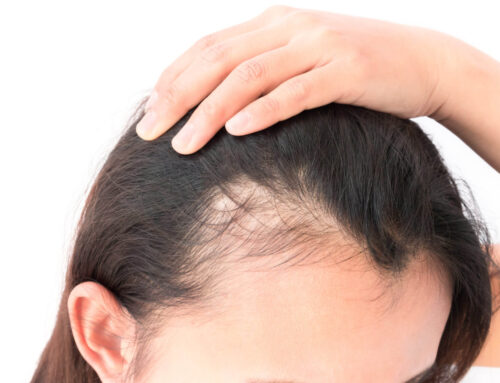Stress-Related Hair Loss
There are many factors that trigger hair loss. But the most important of all is genetic factors. This is the most common cause of hair loss.
Stress-related hair loss, also known as telogen effluvium, can occur when the body experiences a significant amount of stress. Here’s a detailed exploration of the topic:
- Triggering Events: Stress-related hair loss can be triggered by various events, such as a severe illness, major surgery, emotional stress, or drastic weight loss.
- Hair Life Cycle: Stress can disrupt the normal life cycle of hair follicles, pushing a large number of them into the resting phase, followed by hair shedding after a few months.
- Symptoms: The main symptom is a noticeable increase in hair shedding, which usually occurs evenly across the scalp. You might notice more hair on your pillow, in the shower, or on your hairbrush.
- Temporary Condition: Thankfully, stress-related hair loss is typically temporary. Once the stressor has been resolved, the hair usually begins to grow back within several months.
- Management: Managing stress through techniques like meditation, exercise, and counseling can help. It might also be beneficial to ensure a balanced diet and proper hair care to support hair health.
- Medical Consultation: If you suspect you are experiencing stress-related hair loss, it is advisable to consult with a healthcare provider to understand the underlying causes and receive appropriate treatment.
- Treatment: Treatment usually involves addressing the underlying cause of the stress and might include counseling or therapy. In some cases, topical treatments might be prescribed to encourage hair growth.
Understanding and addressing the source of the stress is key to managing and reversing stress-related hair loss. It is always beneficial to seek medical advice if you are experiencing significant hair loss.
The reason why people have hair transplantation is hair loss.
Increasing stress levels can play a major role in hair loss. So know that nothing is in a hurry except health. You are not late for anything. Achieve to stay away from stress.
Causes of stress-related hair loss
- Alopecia areata
- Physical stress
- Emotional
- Telogen effluvium
- trichotillomania (pulling your own hair)
Ways of Treatment
Medication treatments can be applied to the diseases outlined above. In addition, hair transplant applications may also come into question after treatment. With a hair transplant, your hair can be more abundant and healthier than ever.
Diabetes and Hair Loss
Diabetics cannot properly convert glucose into energy. That would increase the level of sugar in the blood. It leads to excessive fat accumulation and poor blood circulation. Poor blood circulation also prevents hair follicles from protecting their health and vitality. Diabetes triggers hormone changes in the body. This can trigger hair loss.
Hair transplant processes
Planning is required before coming to hair transplantation. First, we need to set a date. If we agree with the appointment, your reservation will be made. Then ,when you land in Turkey before the operative , a V.I.P vehicle will wait you at the airport It takes you to the hotel where you will be staying.
The next day is the hair transplant day. The hair is transplanted and the vehicle will take you to your hotel for you to stay again. The next day is the dressing day. The dressing is opened and cleaned. The 3rd day is the washing day. Your first wash is done and you will be taught how to do the next wash.
You are given shampoo and lotions. You do the next wash yourself. You can return to your country from day 3. There is no need for you to come to Turkey again plantation. All of the hair transplanted within approximately a month will fall.
This is a natural outcome we expect. Then the hair starts to grow again. On average, the hair grows again within 4-5 months. At the end of this period, you can have your hair cut if you want. You can extend it if you want. It is completely your choice to use it as you wish.
Creation: 20.11.2020 Last Update: 18.09.2023





Leave A Comment